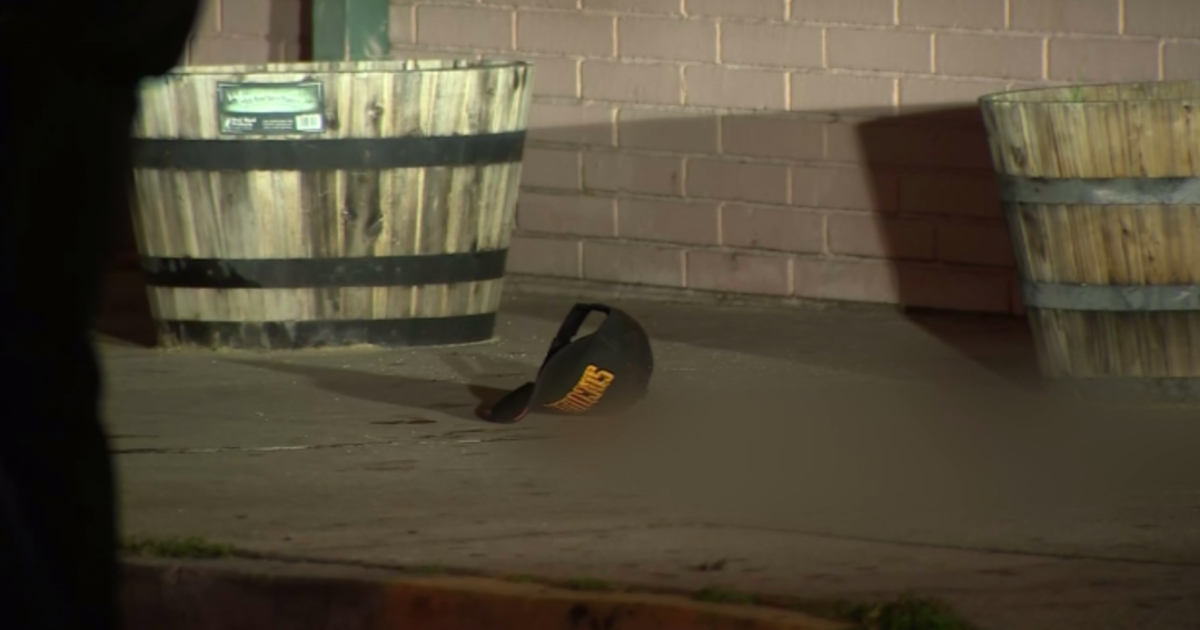With Murder, Suicide, Foreclosures, Assaults, Sometimes Reality TV Is All Too Real
LOS ANGELES (CBS/AP) — Reality came crashing in on Russell Armstrong. With the second season of "The Real Housewives of Beverly Hills" set to premiere in a few weeks, and a pending lawsuit and divorce, the venture capitalist-turned reality personality hanged himself.
Armstrong left behind no note explaining why, leaving others to indict and defend a genre that has seen its share of off-screen turmoil that often dwarfs the drama caught on camera.
The headlines include murder, drug trafficking, overdoses, assaults, financial ruin, and custody disputes and divorces that play out in the tabloids as much as they do courtrooms. Experts caution reality TV is not solely to blame, but the full impact on its participants and audience is not yet known.
At least temporarily, Armstrong's suicide has shaken one of the genre's brashest franchises.
Bravo, which airs "The Real Housewives of Beverly Hills," is re-editing the show's second season, which had planned to focus on the marital strife between Armstrong and his wife, Taylor. The network did not say how it would alter the unaired episodes, or whether it would incorporate any mentions of suicide prevention resources.
Beyond "Housewives," few people, including Russell Armstrong's own attorney, expect the suicide to have broad implications for the reality show industry.
"I don't think it'll make any difference at all," attorney Ronald Richards said in an interview. He said he hoped the show would remove Armstrong from its storyline altogether, but said his client had been warned of the pitfalls of appearing in a reality series before signing on.
"Housewives" has since its debut in 2006 thrived on the divorces, foreclosures and tempers of its well-heeled cast members' lives. The Washington, D.C., version starred a couple accused of crashing a state dinner at the White House, and the first season of the New Jersey version ended with one housewife angrily calling a fellow cast member a "prostitution whore" and overturning a table while the woman's children looked on.
"Real Housewives of Atlanta" star Kandi Burress' fiance A.J. Jewell was killed in a club brawl.
Stars of current hit shows such as "Jersey Shore" have reveled in bad behavior, while even those that aim to help have been rocked by off-screen tragedy. Two alumni of "Celebrity Rehab" -- actor Jeff Conaway and former Alice In Chains bassist Mike Starr have died after their seasons aired.
Richard Hatch, the winner of the first season of the U.S. version of "Survivor" has waged a years-long battle over unpaid taxes and is currently in prison. Also incarcerated is Adam Jasinski, the winner of "Big Brother 9" who is serving a four-year sentence after pleading guilty to possession with attempt to distribute oxycodone and failure to file a tax return for the year he won the reality show's $500,000 prize.
The precise impact of the shows on their stars' later lives is difficult to determine, yet the Armstrongs are just one of many couples whose relationship failures have been chronicled by reality TV.
The so-called "Reality TV Curse" has done in too many marriages and relationships to count.
The TLC-series "Jon and Kate Plus 8" was upended after it was revealed the couple's marriage was in shambles; the reconfigured show "Kate Plus 8" was recently canceled.
Younger parents are also fair game, with shows such as "Teen Mom" showing not only the custody struggles of young mothers, but a street fight that have ended with charges being filed.
"It's really hard to know what would have happened to these people otherwise," said Karen Sternheimer, a sociology professor at the University of Southern California. "We don't have a control group of other drama queens."
During his sentencing, Jasinski pleaded with a judge for leniency, saying he was being treated for bipolar disorder and had squandered his winnings. "Give me a chance to get out and find out who I really am," he begged a judge in January before being sent to prison.
Richards said he believes the show contributed to Russell Armstrong's problems, but he doesn't think producers or its network, Bravo, can be sued or punished.
"These are adults," he said. "I think they have their own obligations."
Most reality shows do some background checks on participants, but mistakes happen. Screening of Ryan Jenkins, a participant on the VH1 series "Megan Wants a Millionaire," failed to turn up records that he had assaulted an ex-girlfriend in Canada. His checkered past was not revealed until after he was charged with killing his wife, a model whose body was found stuffed in a suitcase in Southern California with her teeth and fingers removed, in 2009. After evading authorities and reaching Vancouver, British Columbia, Jenkins killed himself in a hotel room.
Major productions use psychological testing to try to predict how participants will respond to the pressures of the show. And the ones people will face after. For years, producers of MTV's "The Real World" have provided contestants with a psychologist who help them return to their normal lives.
"That's where the biggest problem lies as a psychologist," said Dr. Richard Levak, who helped develop psychological testing for early seasons of "Survivor," "The Amazing Race" and "The Contender."
"You don't know how they're going to unravel," he said.
Producers often want people on their shows who happen to have histories of being abused, depression or other issues. "The most colorful and interesting people were often the ones who have psychological issues," he said, adding that sometimes the shows can be cathartic. Levak no longer does psychological consults on reality series.
"It just became too stressful for me to keep getting the equation exactly right," he said.
Bravo did not respond to an inquiry about whether it screened "Beverly Hills" participants or offered them any counseling during or after taping.
Conflict and competition have been staples of the genre since its beginning, with documentary-style shows now seemingly trying to fill a quota of cast members who fit specific roles and will take a no-holds barred approach to everything from their drinking to their love lives.
The series credited with being the first reality show, "An American Family," featured its share of upheaval. The eldest son of the Loud family revealed during the series that he was gay, and his mother announced her intention to get a divorce while the cameras rolled. Both made for groundbreaking television, and the show differed radically from today's heavily-marketed fare.
"American Family" aired on PBS in the early 1970s. Levak, whose practice is based in the coastal city of Del Mar, Calif., said he fears the drive to produce new, more compelling shows is causing some producers to cut corners. Doing a psychological evaluation on each participant is expensive, and Levak doubts many shows are spending the money. Each show is trying a new angle, and the pool of people willing to put their lives on screen has been diluted by this point, he said.
"You've got this perfect storm scenario where you're looking for more and more twists, more kind of sensational TV. Your pool of eligible (participants) gets smaller, (there are) more shows and shows that are doing it on a shoestring and don't test," he said.
"We're going to see more casualties."
Sternheimer, the USC sociologist who recently released a book titled, "Celebrity Culture and the American Dream: Stardom and Social Mobility," said the desire to appear on reality shows is linked to the longstanding American ideal of success.
"It reinforces this notion that there's an endless amount of economic opportunity in the U.S.," she said. "Reality is, most of them are not going to really see the big payday," she said. (The obvious example of late being Bethenny Frankel, formerly of "Real Housewives of New York City" who reportedly sold her Skinnygirl margarita concept for more than $120 million.)
Reality TV participants -- those who appear in front of the camera -- aren't supervised or covered by unions or entertainment industry watchdogs. They exist in a gray area in Hollywood -- and increasingly in other parts of the country -- that allows many reality shows to be produced for much less than a scripted show starring professional actors. During the Writers Guild strike in 2007-2008, reality shows blossomed as networks put the brakes on scripted shows and plugged their scheduling holes with cheaper-to-produce reality fare.
Stuart Fischoff, a professor who founded the journal Media Psychology, said shows such as "Housewives" have taken a unique place in American culture, but don't necessarily reflect society at large.
"These shows are really not average Americans anymore," he said. "You have a lot of exhibitionists and people who want to get into the biz who are sacrificing themselves."
Richards said in his client's case, he was willing to join "Housewives" to support his wife and build his own brand.
"They prey on an addiction more powerful than heroin or Oxycontin, which is the addiction of being famous," Richards said.
Fischoff said he was surprised that producers and networks hadn't developed a better support system for the former reality star akin to the advocacy group that now lobbies for child actors.
"You're going to have all these people who are walking wounded," he said.
Richards doubts any support network will ever emerge. "I don't think there's a lot of sympathy for these people," he said.
(© Copyright 2011 The Associated Press. All Rights Reserved. This material may not be published, broadcast, rewritten or redistributed.)



